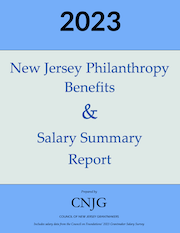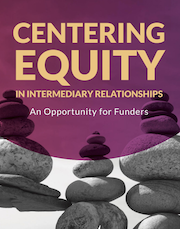Site Search
- resource provided by the Forum Network Knowledgebase.
Search Tip: Search with " " to find exact matches.

The 2023 New Jersey Philanthropy Benefits & Salary Summary Report provides a valuable benchmarking resource for CNJG members on the benefits offered to employees and trustees and salaries for employees. Developed and compiled exclusively for CNJG members, the report presents comprehensive benefits data specific to New Jersey's grantmaking community, alongside data from the Council on Foundations' annual salary survey. Produced every three years, this benchmarking report is a highly anticipated and valued benefit of your CNJG membership.
The first section, 2023 CNJG Benefits Summary Report, includes benefits data for the 2023 calendar year and covers employment numbers, leave benefits, insurance benefits, and more. Within this section, we are pleased to also present demographic data on the board and staff of those that responded. Thank you to the members that completed our benefits survey earlier this year enabling us to produce this report.
The second section, 2023 Grantmaker Salary Tables: National, Mid-Atlantic and New Jersey provides data on compensation across a wide range of positions and grantmaking entities. Thank you to the CNJG members that completed the Council on Foundations’ annual survey on salaries that enabled us to produce this section of the report. Thank you to the Council on Foundations for compiling and sharing this data with us for free to use our report.

The Princeton Area Community Foundation recently awarded $199,000 in COVID-19 Relief & Recovery Fund grants to 25 nonprofits holding summer programs.
These programs will include instructions to help students overcome learning loss caused by the pandemic.
"Through these grants, we are helping 25 nonprofits engage 2,900 children in educational and social-emotional learning programs," said Jeffrey M. Vega, President & CEO of the Community Foundation.
"We know COVID-19 caused significant disruptions to education, especially for students living in under-resourced communities, and we hope these grants will help young people rebound from some of that learning loss and re-engage children in the many community-based programs that were forced to shut down last year."
To prepare for the third phase of COVID Relief funding, the Foundation reached out to nonprofits and other stakeholders to learn about needs throughout the region.
Learning loss due to the pandemic and helping prepare students to return to classrooms were among the highest priorities cited by nonprofits.
According to a report by JerseyCAN, a nonprofit focused on education, a majority of New Jersey's third- through eighth-graders were not on grade level at the start of the 2020-21 school year because of the pandemic.
Americares has announced a $2 million grant from Johnson & Johnson to launch a three-year program aimed at strengthening the resilience of more than 100 safety-net health clinics in areas where climate change disproportionately affects the health of vulnerable communities.
The Climate Health Equity for Community Clinics Program is a collaborative effort between Americares, the Center for Climate, Health and the Global Environment (C-CHANGE) at the Harvard T.H. Chan School of Public Health, Johnson & Johnson, and healthcare providers at participating free clinics and community health centers, which will design tailored interventions that meet the needs of under-resourced and overworked staff. By improving clinic operations and health resilience, the program aims to protect patients’ health during heat waves, wildfires, hurricanes, floods, and other climate-related emergencies.
According to Americares, more than 90 percent of free clinic and community health center patients qualify as low income, and more than half identify as racial and ethnic minorities. The World Health Organization has declared climate change the single biggest threat to humanity—putting clean air, safe drinking water, secure housing, and food supplies at risk—and projects climate change will cause an additional 250,000 global deaths annually from 2030 to 2050, largely due to malnutrition, malaria, diarrhea, and heat stress.
Please join us as we kick-off our 2024 meetings with a discussion on the Vote 16 campaign. Last August, the New Jersey Institute for Social Justice released Let Us Vote: Why 16-and-17-Year-Olds Should Be Allowed to Vote in Local Elections and Beyond, a policy brief arguing that New Jersey municipalities should lower the voting age to 16 for local and school board elections. Last month, the Newark City Council made Newark the first city in New Jersey to extend the vote to 16 and 17 year olds. With a year until implementation, the funding community has an opportunity to discuss how it can support youth serving and youth leadership organizations prepare youth to exercise their new right.
We will also spend the second half of our meeting updating each other on our current funding priorities and identifying possible areas of collaboration for this group. We would recommend that you scan Grantmakers for Education’s Trends in Education Philanthropy: Benchmarking 2023 ahead of the meeting to inform our conversation.
Guests
Ryan Haygood, President and CEO, New Jersey Institute for Social Justice
Amanda Ebokosia, Executive Director, the GEM Project
Cost: Free for CNJG Members; $50 for Non Member Grantmakers.
ADOPTED: 10/20/2023
APPROACH
CNJG takes an active role in championing the vital role New Jersey’s nonprofit sector plays in the state. We advocate for public policies that support a strong and fair economy, the economic and social well-being of New Jersey’s residents, a healthy environment, and civically engaged and educated communities. In keeping with our vision, we seek to advance equity and inclusive public policies. We promote participatory philanthropy, which seeks to include a diversity of voices in public policy development and implementation and ensure that those most affected are included in the public policymaking process. We advance trust-based philanthropy, which seeks to foster equitable relationships within the nonprofit and philanthropic sectors by redistributing power — systemically, organizationally, and interpersonally — in service of a healthier and more equitable nonprofit sector. We focus our public policy efforts on issues that affect or impact the nonprofit and/or philanthropic sectors, that potentially have long-term, systemic impact, and where the involvement of CNJG could positively shape the outcome of an issue. We encourage policymakers to engage with us and think of us as a resource as we advocate for strong policies to strengthen New Jersey’s nonprofit sector and recognize the sector for the valuable and essential role that it plays.
POLICY PRIORITIES
ADVANCE RACIAL EQUITY AND JUSTICE. Philanthropy has a critical role to play in dismantling structural racism by advancing equitable public policy. We seek to analyze and support public policies that further racial equity, eliminate persistent racial disparities, and promote equitable outcomes across issue areas including health and well-being, education, economy, housing, and the environment.
A WELL-RESOURCED NONPROFIT SECTOR. A resilient and well-resourced New Jersey nonprofit sector is essential to a healthy and equitable New Jersey and a resilient economy that works for all. Too often, the nonprofit sector is under-resourced and under-valued for the critical role that it plays. We support policies that eliminate barriers to effective nonprofit operations, enable long-term fiscal planning, and encourage all New Jersey residents to support and engage with the nonprofit sector. Examples of policies we support include:
- state contracts that adequately compensate staff.
- multi-year investments in the nonprofit sector.
- government policies that support nonprofit innovation.
- reductions of “red tape.”
- increased government transparency.
- incentives for New Jersey residents to engage in charitable giving.
A COLLABORATIVE ENVIRONMENT TO SUPPORT INNOVATION. We seek to foster collaboration and enhanced coordination among the nonprofit sector, philanthropy, and government at all levels. We support public policy initiatives and innovative efforts that further this aim.
SUPPORTING NONPROFITS’ ADVOCACY ROLE. We work to protect the vital ability of the nonprofit sector to advocate and engage in public policy, recognizing that the nonprofit sector plays an essential role in strengthening New Jersey’s economy, improving the lives of New Jersey residents, and advancing equity.
INVESTING IN PREVENTION, RESPONDING TO CRISIS AND SUPPORTING LONG-TERM RECOVERY. The philanthropic sector is often called upon to respond in times of crisis. We support public policies that make necessary investments to prevent such crises, including health, climate and natural disasters.
We also advocate for policies and investments to adequately respond to such crises and invest in long-term recovery, with a focus on prioritizing the needs of those communities that are most at-risk and hardest hit.
A HEALTHY DEMOCRACY & ENGAGED COMMUNITIES/CIVIC ENGAGEMENT. We support public policies that foster a healthy democracy, an engaged and educated populace, and the right of New Jersey residents to freely exercise their right to vote. We seek to advance efforts that remove barriers to civic engagement and voting.
***
ABOUT THE COUNCIL OF NEW JERSEY GRANTMAKERS
VISION
The Council of New Jersey Grantmakers envisions a healthy, thriving, and civically engaged New Jersey where people of all places, racial and ethnic identities, socio-economic backgrounds, abilities, and identity expressions are valued for their gifts and talents, and we all can reach our full potential and participate generously in the common good.
MISSION
The Council of New Jersey Grantmakers supports and elevates New Jersey’s philanthropic community through shared learning, collaborative and trusting relationships, network building, and leadership.
CORE VALUES
CNJG values shared power and leadership to advance our mission and vision. We look for opportunities for individual members, member institutions, and allied organizations across the social sector to engage in a common cause of supporting and elevating New Jersey's philanthropic community.
From expanding access to programs to exploring the inequitable origins of wealth, CNJG values equity as an organizing principle and lens for looking at our structure, business model, programs, and communications.
CNJG values trusting cross-sector relationships grounded in inclusion that seek out diverse voices, contributions, and participation from across the social sector. We are a network that works to form new alliances and broad coalitions to advance our mission and vision.
CNJG values learning and dialogue across our community as we explore, engage, and identify new ways of organizing ourselves and redefining philanthropy in broader ways.
The New Jersey Council for the Humanities has awarded 18 grants totaling $216,319 in its most recent grant round. These funds will support a diverse array of projects in nine counties across the Garden State, highlighting NJCH’s ongoing commitment to fostering the public humanities.
Of the 18 awarded projects, five had their beginnings in prior NJCH grants or programs.
Two organizations, the AIDS Resource Foundation for Children and the Hispanic Family Center of Southern NJ, received funding for projects that expand upon the Dear Rosa Project, an oral history initiative amplifying the voices of women living with HIV/AIDS that was funded by a prior NJCH grant. Additionally, Clinton Hill Community Action and Raíces Cultural both received funding to extend projects initially developed in NJCH’s Community History Program. And Truehart Productions received funding to produce a new episode of the PBS documentary series “The Price of Freedom,” which previously received developmental funding from an NJCH incubation grant.
“We are thrilled to see the continued impact and evolution of projects that have received our support in the past. Their success demonstrates the profound influence of our programs on the public humanities in New Jersey,” NJCH Executive Director Carin Berkowitz said. “The diverse and dynamic projects funded in this round will significantly contribute to the understanding and appreciation of our state’s rich cultural heritage.”
